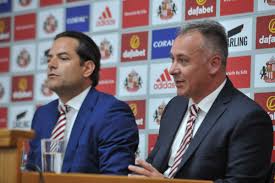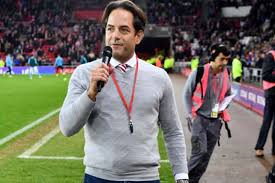
Monsieur Salut writes: it is a pleasure to come across a New York take on Sunderland that doesn’t just gasp in disbelief at the turkeys-voting-for-Christmas syndrome.
When the Dow Jones financial newspaper Barron’s decided SAFC was worth a look for its Penta section, the task fell to Tom Teodorczuk, who grew up in Virginia but also studied at Durham so knows the patch. It’s an interesting read – and can be seen in its original form at this link – and I will leave the Americanised spellings unchanged. It appeared beneath the peculiarly American headline, ‘The Rebirth of the UK’s Sunderland Soccer Club’ …
On the day after Christmas, Charlie Methven, executive director of soccer team Sunderland AFC, took to the field during halftime of the game against Bradford City to address 46,039 fans at the team’s Stadium of Light in northeast England.
“I set a challenge to reach 40,000 [spectators] today, and I massively underestimated you!” he told Sunderland’s long-suffering supporters.

Sunderland has endured a traumatic two years, with successive demotions—from England’s lucrative Premier League, or EPL; to English Football League Championship, English soccer’s second division; then to EFL League One, the third tier—as well as heavy financial losses and destabilizing managerial and player turnover.
But Methven was ending 2018 on a high. The team, under recently appointed manager Jack Ross, a young Scottish coach with an honors degree in economics, stood third in League One. Should Sunderland retain its good form until the end of the season in May, it will bounce back up to the Championship, one tier from the Premier League.
Methven became executive director last May after his business partner, billionaire insurance tycoon Stewart Donald, bought the team for just over US$50 million. Donald purchased Sunderland from Ellis Short, the US private-equity billionaire who had owned it since September 2008, and enlisted Methven, founder of a financial-communications company, to run its day-to-day operations.
Together, they have radically reshaped the relationship between Sunderland’s owners and its fans.
Not only did Methven smash his spectator target, but Sunderland also set a League One attendance record and achieved the third-highest crowd figure of the day in all divisions, surpassed by only Manchester United and Liverpool.

In previous seasons, the team’s relationship with its supporters had grown fractious. Yet now, instead of wasting money on expensive, underperforming players, the club’s efforts to engage the grassroots had literally paid off, with a revenue spike of almost US$400,000 arising from the attendance record.
That day will probably feature in the second season of the hit Netflix documentary Sunderland ’Til I Die. The first season of the eight-part series was released globally in December.
Owning an English soccer team has become a badge of honor for today’s billionaires. Examples include Roman Abramovich’s stewardship of Chelsea, and Abu Dhabi royal Sheik Mansur, who owns current Premier League champions Manchester City. In the EPL, nine of the 20 teams are owned by billionaires.
The appeal to ultrahigh-net-worth individuals of owning a soccer team varies. Former Disney CEO Michael Eisner owns Portsmouth, which sits [sat – Ed] atop League One. He says the unscripted drama of the sporting kind rivals the entertainment supplied by the blockbusters he oversaw while at Disney. “The passion and drama is there in both cases,” he says, “but you can’t get out of your seat to influence a game.”
But having a wealthy owner is hardly a guarantee of success. Short, who is from Missouri and made his estimated US$1.2 billion in private equity, took over Sunderland in 2008. The team under Short was plagued by profligate spending on player wages and by administrative chaos, with 11 managers in 10 years.
Although Short spent US$250 million on the club, Sunderland habitually flirted with demotion from the Premier League, only to switch managers and avoid relegation with late-season revivals. “It wasn’t a plan,” Methven says. “It was a game of Russian roulette.”
After back-to-back demotions,“the community and fan base grew disunited because the club has been so nastily run for so long,” Methven says. The fans “hated the players; they hated the people who were managing and running the club.” Short, who had stopped investing in the club, sold it to new owners Stewart Donald and Uruguayan businessman Juan Sartori.
Donald and Methven had previous experience running soccer clubs in the south of England, where both are from. But nothing prepared them for taking over the club in Sunderland, a northern city economically decimated by the decline of its shipbuilding and mining industries. The team has a storied past, winning six top-flight league titles, although the last of those was in 1936. It won its last major trophy in 1973.
The task of turning around Sunderland was aided by the team having a large fan base and by existing infrastructure. Sunderland boasts a thriving youth academy and an active charity arm.
But Sunderland had an annual operating loss of US$45 million and was paying more than US$10 million a year in interest payments when the new owners took over.
“Obviously, we took over a club that wasn’t in a good state on the playing side, but also in a disastrous state on the financial side, losing vast amounts of money every year,” Methven says. “We’d like to turn the club into a sustainable entity again.”
That means raising revenue by more than 20%, which they have achieved through organizing more music concerts at the Stadium of Light and boosting attendance at games. Costs have been squeezed, with Sunderland closing unprofitable team shops and reducing personnel. “Every bit of expenditure that’s not spent on bringing new, better players to the club…will result in vast sums of money being lost,” Methven says. To help balance the books, Sunderland is placing added emphasis on home-grown players—such as the club’s 24-year-old captain George Honeyman.
Methven stresses the need “to rebuild a sense of community around the club so people feel connected. It sounds simple, but most football clubs these days don’t do it because the people running them are not prima facie originally football fans themselves. They view fans as consumers or customers, not as members. We view them as members.”
Netflix is producing season two of Sunderland ’Til I Die, albeit one that the owners hope will have a happier ending.
For Methven, the goal is simple: “It’s the duty of the people who take over a football club to leave it in a better state than when they took it over.”

Definitely our Durham.
While Stewart Donald is a lot wealthier than your humble regular contributors to Salut! Sunderland (unless of course Jake has kept quiet about signing a multi million Euro record deal or Sixer won the Euro millions and ticked the no publicity box) I don’t think he’s a billionaire.
There is of course a Durham in North Carolina which is quite a distance from Sherburn and Witton Gilbert and I assume it has a university too but I take it M Salut means the proper one.
You have to hand it to Tom Teodorczuk, a USA national who understands football and most of all, he gets SAFC.
The UK media don’t and probably don’t care, being so far up themselves falling over the Premiership.
Then again these media hacks couldn’t get anywhere near a Durham University education.